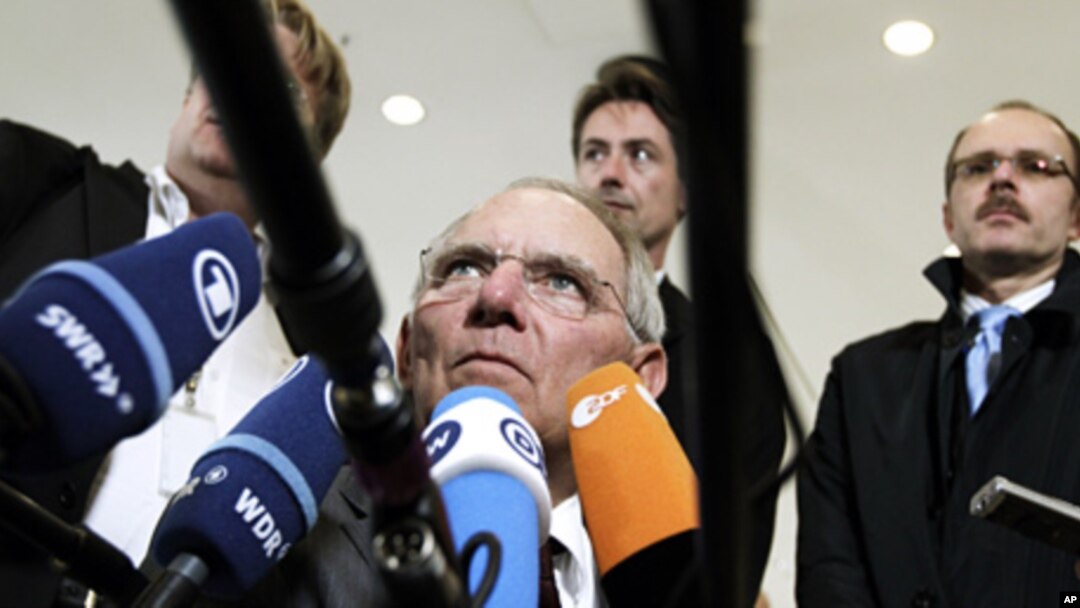PARIS - European finance ministers are discussing how to tackle Europe's sovereign debt and banking crisis during a two-day meeting in Luxembourg. The talks begin a series of critical economic meetings.
The eurozone finance ministers have plenty on their plate in talks that stretch through Friday, and that will be complemented by a summit in Rome among French, German, Spanish and Italian leaders. The subject is the same; how to contain and turn around the eurozone's financial crisis, now in its third year.
Economist Tomasz Michalski, of the HEC business school in Paris, says there is no easy answer.
"Each of these countries have different problems and the issue is there on one solution that would help save the day in every one of those countries," said Michalski. "Those that are the most distressed countries. But in many European countries, growth has been lackluster."
As usual, Greece's economic problems will be a top agenda item. But more skeptical analysts like Michalski say the new, pro-eurozone government in Athens offers a breather, but not a solution.
"The problem with Greece is that even if they renegotiate [their bailout terms] now, this does not mean the Greek economy is going to be saved at all," he said. "Because essentially what we are facing in Greece is a standstill."
Spain's troubled banks will also be in the spotlight, with finance ministers expected to discuss the specifics of a bailout. The EU ministers will also tackle two other problem economies, Italy and Cyprus, witch may be next in line for bailout funds.
"Cyprus is suffering a banking crisis because the Cyprus banks were deeply involved in Greece," said Michalski. "So basically, they are suffering an economic contagion because of a larger neighbor's problems."
Europe's ongoing financial worries were among the main topics of this week's Group of 20 summit. European Commission chief Jose Manuel Barroso summarized the message that emerged from the Mexico meeting.
"There is today an overall, an international plea to ask the European Union and namely the euro area to deepen its integration, to build a banking union, through economic and monetary union, and even making appeals to a political union," said Michalski.
European leaders are expected to produce a more detailed plan to address the eurozone crisis during a summit next week. But economist Michalski says that while they may discuss one major reform, a future banking union, they are unlikely to agree on others that experts say are needed.
The eurozone finance ministers have plenty on their plate in talks that stretch through Friday, and that will be complemented by a summit in Rome among French, German, Spanish and Italian leaders. The subject is the same; how to contain and turn around the eurozone's financial crisis, now in its third year.
Economist Tomasz Michalski, of the HEC business school in Paris, says there is no easy answer.
"Each of these countries have different problems and the issue is there on one solution that would help save the day in every one of those countries," said Michalski. "Those that are the most distressed countries. But in many European countries, growth has been lackluster."
As usual, Greece's economic problems will be a top agenda item. But more skeptical analysts like Michalski say the new, pro-eurozone government in Athens offers a breather, but not a solution.
"The problem with Greece is that even if they renegotiate [their bailout terms] now, this does not mean the Greek economy is going to be saved at all," he said. "Because essentially what we are facing in Greece is a standstill."
Spain's troubled banks will also be in the spotlight, with finance ministers expected to discuss the specifics of a bailout. The EU ministers will also tackle two other problem economies, Italy and Cyprus, witch may be next in line for bailout funds.
"Cyprus is suffering a banking crisis because the Cyprus banks were deeply involved in Greece," said Michalski. "So basically, they are suffering an economic contagion because of a larger neighbor's problems."
Europe's ongoing financial worries were among the main topics of this week's Group of 20 summit. European Commission chief Jose Manuel Barroso summarized the message that emerged from the Mexico meeting.
"There is today an overall, an international plea to ask the European Union and namely the euro area to deepen its integration, to build a banking union, through economic and monetary union, and even making appeals to a political union," said Michalski.
European leaders are expected to produce a more detailed plan to address the eurozone crisis during a summit next week. But economist Michalski says that while they may discuss one major reform, a future banking union, they are unlikely to agree on others that experts say are needed.


